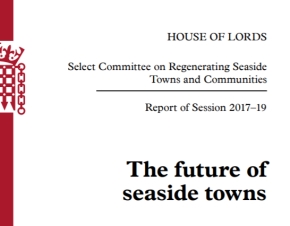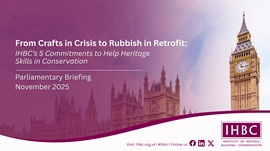Future of seaside towns
In April 2019, the Regenerating Seaside Towns Committee of the House of Lords published a report on the future of seaside towns, and noted that many coastal communities are in need of investment, particularly in housing, transport, education and infrastructure.
The Committee wrote:
Many seaside towns and coastal communities are in desperate need of improvements to transport, housing and broadband. Better access to further and higher education for young people in seaside towns is needed too.
The Chairman of the Committee, Lord Bassam of Brighton, said:
"For too long, seaside towns have been neglected. They suffer from issues rooted in the decline of their core industries, most notably domestic tourism, but also in fishing, shipbuilding and port activity, and from their location at the ‘end of the line’. The potential impact of Brexit on these towns, particularly the hospitality sector, also remains an open question.
"A single solution to their economic and social challenges doesn’t exist. What is needed is a package of strategic initiatives and interventions where national and local government work together to address issues such as transport, housing, post-school education and high-speed broadband.
"Places like Brighton and Bournemouth have shown that ‘the seaside’ can successfully reinvent itself. The Committee is confident that if our recommendations are pursued seaside towns can once again become prosperous and desirable places to live in and visit."
The main findings and conclusions from the report include:
- The challenges of peripherality in coastal areas can be overcome by improving digital connectivity. The Government should promote initiatives to support digital connectivity in coastal communities specifically. It should engage with local authorities, Local Enterprise Partnerships (LEPs) and businesses in remote coastal communities to understand how better digital connectivity, such as high-speed broadband, can be delivered.
- Limited access to education, particularly to FE and HE institutions, is severely curtailing opportunities and denting aspirations for young people in some coastal areas. The Government needs to facilitate partnership working between the FE and HE sectors, and local business and industry, in coastal and other isolated areas.
- Poor-quality housing is a significant problem for many seaside towns. The Committee recommends a package of measures for housing to help tackle perverse financial incentives to offer poor accommodation, ease the pressures on inspection and enforcement regimes, and to support more regeneration of existing housing.
- Inadequate transport connectivity is holding back many coastal communities. The Government should prioritise improvements to the coastal transport network when it takes decisions on planning and investment. This should be informed by a detailed review of the coastal transport network.
- Many seaside towns feel left behind by national strategies aimed at increasing economic growth and productivity. Local Industrial Strategies present a key opportunity for renewed focus on addressing the skills gaps, low-wage economies and aspiration challenges faced by many coastal communities. As LEPs develop these strategies, the Committee recommends that they are given a specific requirement to consider the needs of deprived seaside towns and communities.
- The UK Shared Prosperity Fund, which is set to replace EU funding after Brexit, is an important opportunity to help support coastal business development, and to tackle deprivation in coastal communities. The Government must be clear about how coastal areas will benefit from the Fund. The Fund should prioritise solutions for areas where there has been persistent deprivation, including disadvantaged coastal communities.
- The Coastal Communities Fund is viewed as too small scale to support sustainable regeneration. The Government should review the Fund’s effectiveness. If it is making a positive impact, then it should continue with it and increase the Fund’s resources.
- The Committee strongly supports the Grimsby town deal, involving a strategic approach between national and local government, and LEPS. The Committee recommends that the Government should secure town deals with other coastal towns. Given that issues relating to housing and deprivation in Blackpool are well-recognised as being some of the most significant in the country, the Committee recommends a town deal is secured with Blackpool first.
- A variant of Enterprise Zones designated specifically for coastal areas could offer seaside towns a package of placed-based interventions. This could support long term, sustainable change. The Committee recommends that new Enterprise Zones be created in coastal locations, and that the support offered should be tailored to meet the specific needs of seaside towns.
- Some towns have boosted regeneration by cultivating their local creative industries. The Committee supports this arts-led regeneration and wishes to see other towns diversifying their economies and enhancing their local cultural assets in this way….
You can download the report on the parliament website
This article originally appeared on the IHBC Blog.
--Institute of Historic Building Conservation
Related articles on Designing Buildings
- A vision of the Future – A blueprint for the Industry from Canada’s West Coast.
- Coastal change management area.
- Coastal defences.
- Coastal Transition Zone.
- Conservation.
- Conserving Cornish harbours.
- England's seaside heritage from the air.
- Enterprise Zones.
- Heritage coast.
- IHBC articles on Designing Buildings Wiki.
- IHBC.
- Local Enterprise Partnerships.
IHBC NewsBlog
Latest IHBC Issue of Context features Roofing
Articles range from slate to pitched roofs, and carbon impact to solar generation to roofscapes.
Three reasons not to demolish Edinburgh’s Argyle House
Should 'Edinburgh's ugliest building' be saved?
IHBC’s 2025 Parliamentary Briefing...from Crafts in Crisis to Rubbish Retrofit
IHBC launches research-led ‘5 Commitments to Help Heritage Skills in Conservation’
How RDSAP 10.2 impacts EPC assessments in traditional buildings
Energy performance certificates (EPCs) tell us how energy efficient our buildings are, but the way these certificates are generated has changed.
700-year-old church tower suspended 45ft
The London church is part of a 'never seen before feat of engineering'.
The historic Old War Office (OWO) has undergone a remarkable transformation
The Grade II* listed neo-Baroque landmark in central London is an example of adaptive reuse in architecture, where heritage meets modern sophistication.
West Midlands Heritage Careers Fair 2025
Join the West Midlands Historic Buildings Trust on 13 October 2025, from 10.00am.
Former carpark and shopping centre to be transformed into new homes
Transformation to be a UK first.
Canada is losing its churches…
Can communities afford to let that happen?
131 derelict buildings recorded in Dublin city
It has increased 80% in the past four years.
















